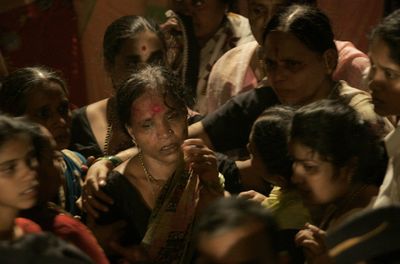Indian forces hunt for missing
Government blames foreigners for attacks

MUMBAI, India – Indian commandos rooted through two smoldering luxury hotels here this morning, searching for survivors, the dead, and the last of the gunmen whose choreographed rampage of terror through this cosmopolitan city spawned a mystery about their identities and motive.
The brazen attacks that also targeted transportation centers, a hospital and a Jewish community center killed at least 125 people and wounded another 325. Sporadic gunfire and occasional explosions continued to be heard in parts of Mumbai early today, and an unknown number of people remained missing.
Eight foreigners were among the dead, and the U.S. State Department said three Americans had been wounded. But most of those killed and injured were Indian.
By midmorning today, officials estimated that possibly 10 militants remained at large – one in the Taj Motel and four others in the Oberoi hotel, with another five holed up in the Jewish center.
They said 15 hotel guests, mostly foreigners, remained trapped inside a 21-floor wing of the Oberoi.
Ten hostages believed to be Israeli citizens were held at the Jewish center, where Indian security forces launched a counterattack as the city awoke. Black-clad commandos descended from helicopters, and sharpshooters opened fire from surrounding buildings. The outcome of the firefight was not immediately clear.
“We watched 24 commandoes surround the building,” said Bharat Phulsunge, a 28-year-old insurance agent. “We can hear gunfire and explosions from inside. It’s still very tense.”
Even as troops moved floor to floor through the besieged hotels liberating trapped guests, the Indian government was blaming foreign elements for the mayhem. Indian Prime Minister Manmohan Singh went on national television Thursday, asserting that the organizers of the attacks were “based outside the country.”
In what was seen as a thinly veiled indictment of Pakistan, he warned India’s neighbors “that the use of their territory for launching attacks on us will not be tolerated.” Other government officials were quoted in Indian media alleging that the squads of gunmen had charged ashore from rubber boats that fanned out from an unidentified mother ship.
In response, Pakistan’s defense minister condemned the Mumbai attacks and warned India to refrain from accusing its longtime rival of involvement. And some security experts warned that India has plenty of homegrown extremists who could be behind the violence.
Whatever their origin, it was clear the squads of attackers were well-prepared. The militants struck after months of reconnaissance during which they set up “control rooms” in the targeted hotels, according to Indian officials and an owner of one of the targeted hotels.
“It’s the opening of a new front, a strike in a place that causes surprise,” said Louis Caprioli, a former French counterterrorism chief. “And it is unique because it’s a military operation that leaves the security forces confused and disorganized.
“For the first time in the long time, you see the use of combatants who take hostages, like the Palestinians in the 1970s,” he said. “They were ready to die, but they were not suicide attackers.”
Past attacks on Indian targets here and abroad have been the work of an evolving, interconnected array of murky Pakistani extremist groups tied to al-Qaida and, sometimes, current or former Pakistani security officials. They include Lashkar e Toiba, which took part in a bloody siege of the Indian Parliament in 2001 and seems a prime suspect in this case, according to officials and experts.
“This is a group affiliated with al-Qaida,” said Sajjan Gohel of the London-based Asia-Pacific Foundation.
“There are eerie similarities to the Parliament attacks.”
But Lashkar e Toiba has reportedly denied involvement. And antiterrorism officials warned against speculation because the evidence is limited. India has a history of violence by Hindus and criminal mafias as well as Muslim extremists.
Most of Mumbai remained in shock Thursday. Once known as Bombay, the city is home to India’s commodities and stock exchanges, which remained closed Thursday despite fears about the effect of the terrorist attacks on foreign investment.
In many neighborhoods, 80 percent of the businesses remained closed as police warned residents to stay home, where many followed the unfolding drama on television.
Simone Ahuja, an Asia Society associate fellow and founder of a video production house in Mumbai, said the choice of targets favored by foreigners was clearly a blow aimed at dislodging closer U.S.-India ties. And she said the damage done to the Taj Mahal Palace Hotel, a waterfront landmark that suffered bomb damage and whose giant towers were licked by flames, may leave emotional scars on the city.
“People are in tears watching their city fall,” said Ahuja, who shares her time between Mumbai and Minneapolis.
“This is like what happened to the World Trade Center. This will fundamentally change the mental and visual landscape.”
Meanwhile the attacks appeared to be petering out. Although occasional explosions and gunfire were heard through the night Thursday, military officials said that most, if not all, of the hostages at the Taj Hotel had been freed.